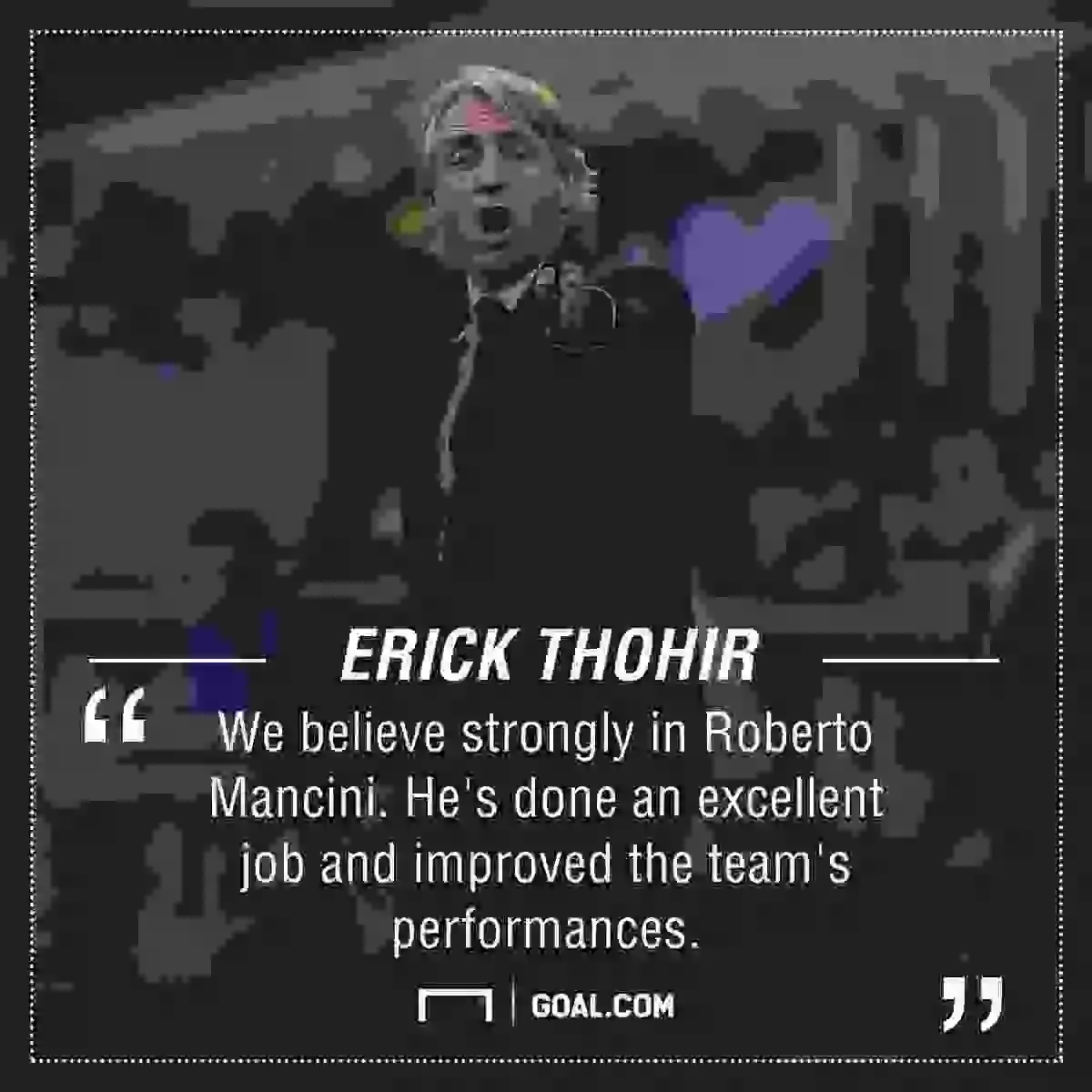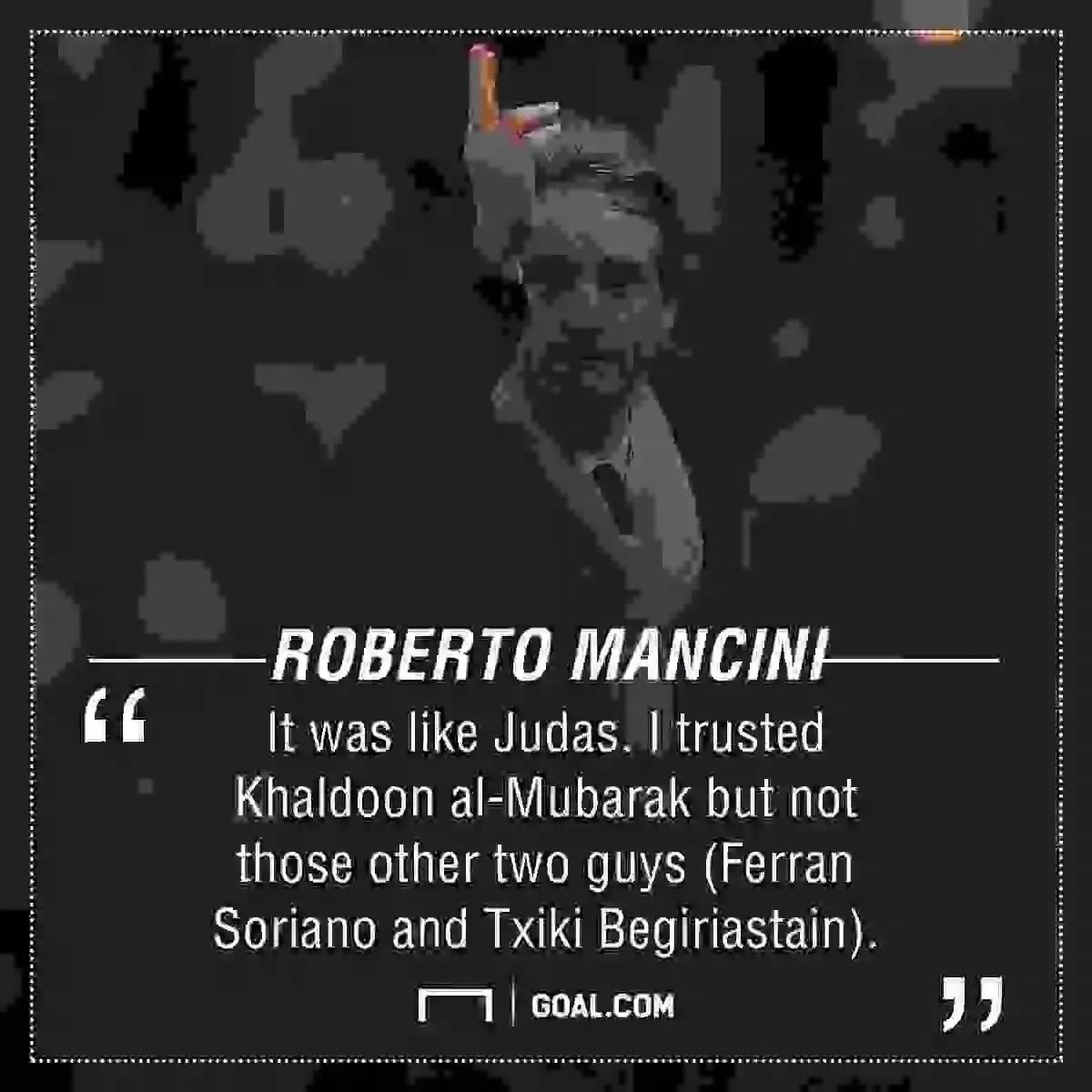The vote of confidence arrived on June 26. "We believe strongly in Roberto Mancini," insisted Inter president Erick Thohir. The inevitable parting of the ways has come just six weeks later.
The suddenness may be a surprise but the split is not: Mancini has plenty of previous in this regard. This time around, he has been at odds with Thohir and Inter's new owners ever since it was announced that the Indonesian had sold a 68.55 per cent of the club to the Suning Holdings Group in June. There were issues over both the proposed extension of Mancini's contract and the club's summer transfer strategy.
The two parties had held talks over the ex-Italy international committing himself to the San Siro side until 2019 but Mancini was perturbed by a perceived lack of urgency on the part of his employers to renegotiate an agreement that only had 10 months to run. He sensed a lack of support - and the club's dealings in the transfer market did little to soothe his concerns.
The former Manchester City boss boss made no secret of his desire to be reunited with Yaya Toure at San Siro - but his interest in a 33-year-old midfielder, as well as Thomas Vermaelen, was completely at odds with the Suning Group's plan to rejuvenate the Nerazzurri's squad, as underlined by their enthusiastic pursuit of Gabigol.
Antonio Candreva, one of Mancini's main transfer target, was acquired from Lazio but, as far as Mancini was concerned, it was very much a case of too little, too late. He wanted to set off for the American leg of their pre-season programme with the squad with which he wanted to start the new Serie A season. Instead, Inter departed under a cloud of uncertainty - over the future of both their coach and their captain, Mauro Icardi, whose partner and agent, Wanda Nara, has been openly flirting with Napoli.

In that context, it is hardly surprising that Inter's pre-season results have been woeful. They have played seven games to date, winning only one. Saturday's second-half capitulation at the hands of Tottenham was embarrassing but the 6-1 defeat did not seal Mancini's fate. Thohir and CEO Michael Bolingbroke had already advised the Suning group against retaining the services of the ex-Italy international, with sporting director Piero Ausilio having been despatched to Netherlands to offer Frank De Boer a three-year deal.
Furthermore, fact that Kia Joorabchian has a close bond with the new owners hardly helped Mancini's cause. The Iranian-born businessman, who has been working as a consultant for Suning, has an infamously strained relationship with Mancini, with the pair having clashed regularly during Carlos Tevez's time at City.
It is unsurprising then, that Mancini has agreed to part company with a club that had clearly lost faith in him. When the first rumours of discontent behind the scenes surfaced, it initially seemed as if a split was unlikely. It was felt that both the club and the coach needed one another. However, Thohir and Suning have now decided otherwise.
The worry for Mancini is where he goes from here. This is the fourth time in a row that he has left his job because of a dispute his employers. During his first stint at San Siro, he angered former Inter president Massimo Moratti by publicly claiming after a defeat to Liverpool in March 2008 that he intended to stand down at the end of the season, which was seen as a petulant, knee-jerk reaction to rumours that the club wanted Jose Mourinho to replace him.
Mancini declared his intention to stay the very next day but when Moratti did send the ex-Italy international packing, the Nerazzurri used the March outburst to justify the decision.
"Internazionale have informed Roberto Mancini of his dismissal from the position of head coach of the first team, in particular because of the declarations made by the coach after the Inter-Liverpool match last 11 March 2008," read a club statement realised on May 29 of that year.
Of course, he would go on to win the Premier League title in 2012 - in dramatic fashion - at City but his time at the Etihad also ended in acrimony. Indeed, just a year after leading the Manchester outfit to a first championship success since 1968, Mancini was shown the door. He did not leave quietly.

"I know a lot of people in football and I found out afterwards that they were talking to three or four managers in February, March and April," he stated shortly after his departure. "I know they were talking to Pep Guardiola and Carlo Ancelotti. And these were the same people I sat down with for dinner before the FA Cup final.
"It was like Judas. I trusted the chairman Khaldoon al-Mubarak 100 per cent but not those other two guys (CEO Ferran Soriano and sporting director Txiki Begiriastain); he probably just followed them.
"Some people just don't have the courage to talk face to face. Even Khaldoon did not tell me to my face what was happening. He could not just come up to me and say, 'We did four years together, we won everything, we are happy, but now the job is finished.'
"Instead, they were working behind my back and sacked me two games before the end of the season. I did not even have the chance to say goodbye to the Manchester City fans."
As a result, he elected to take out a full-page advert in the Manchester Evening News to bid farewell and express his gratitude for their continued support. Still, during his next post, at Galatasaray, Mancini once again proved incapable of cultivating such strong ties with his bosses.
He led Gala to a second-placed finish in the Super Lig and lifted the Turkish Cup yet parted company with the club at the end of the 2013-14 campaign by "mutual consent". In truth, there had been another relationship breakdown, with Mancini once again left feeling betrayed. "As a coach, I understand the demands of the club," he told the Gazzetta dello Sport. "However, when I accepted the coaching post, Gala’s aims were different..."
It is this inability, or perhaps refusal, to adapt that has characterised Mancini's coaching career to date - both on and off the field. He and his teams are defensive, aggressive, rigid and set in their ways. Unlike his compatriot Carlo Ancelotti, Mancini is not a great diplomat. He has not yet learned that, in the modern game, a coach must carefully manage not only his players, but also his employers. As a result, he is once again looking for a new job and, this time around, it could take quite a while to find one.
>
.....
- Goal